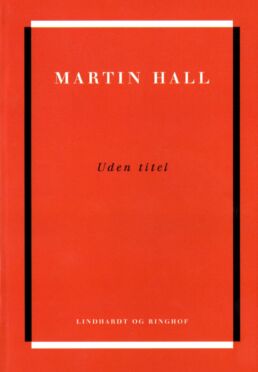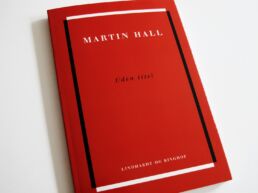UNTITLED
MARTIN HALL
PROSE POETRY
SEPTEMBER 1998
LINDHARDT OG RINGHOF (ISBN 87-595-1053-6)
With the release of his fifth book, Untitled (“Uden titel”), Martin Hall marked a change in his career as a writer, not just by changing publishers – leaving Borgens Forlag to sign up with Lindhardt og Ringhof – but more importantly by writing his most coherent piece of literature so far.
The book was received very well by the press and is regarded as Hall’s literary breakthrough by most critics.
In comparison to his prior works Untitled shares some similarity with the form and style in Continuum from 1989, but diverts in content by its more decadent and temperamental nature. The style of writing is witty, pompous, yet very self-aware and vulnerable.
Genre: Prose poetry
Pages: 61
Design: Jens Kruse
"Beauty is a fragile thing. A shadow you can break a piece off to keep, inscribe in your own dream and then leave at a later date."
”Martin Hall is a phenomenon. He is unique.”
Weekendavisen [the Danish equivalent to The Observer)
“Pompous like hell, but also fiercely ironical and very funny.”
Jyllands-Posten (Denmark’s biggest daily newspaper)
”It’s relieving to read texts that aren’t afraid of being politically uncorrect … great linguistic energy and authority.”
Standart (Denmark’s most respected literary magazine)
”A therapeutic tour de force into the sickest corners of the human mind.”
Aktuelt (major Danish newspaper)
”In his honour: Martin Hall’s monstrous staging of himself is exercised with a great sense of humour.”
Information (the Danish equivalent to The Independent)
”Visionary, vehement and fascinating.”
Aarhus Stiftstidende (major regional newspaper)
The following description is taken from the publishing agency Lindhardt og Ringhof’s autumn catalogue at the time of the book’s release:
”In 1989 Martin Hall released Continuum which was his personal farewell to the eighties. With his new book, Untitled, he once again reflects upon a decade, this time through a series of very personal writings aimed at the spirit of the nineties. His criticism is formulated from a both aggressive and intellectually aristocratic point of view, all the time carried by a search for harmony and completeness.”


